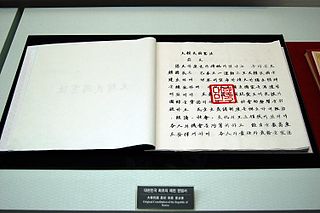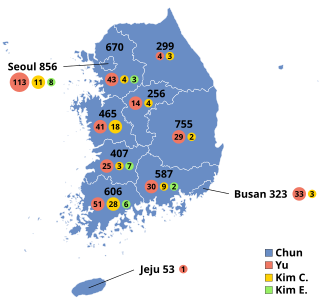Hong Seok-hyun is a South Korean media mogul and diplomat who is the chairman of JoongAng Holdings, the Korea Peace Foundation, and the Korea Baduk Association. He is a brother-in-law of Lee Kun-hee.

The Fourth Republic of Korea was the government of South Korea from November 1972 to February 1981.

The Constitution of the Republic of Korea is the supreme law of South Korea. It was promulgated on July 17, 1948, and last revised on October 29, 1987.

Two-stage presidential elections were held in South Korea in February 1981. An electoral college was elected on 11 February, which in turn elected the president on 25 February. They were the last indirect presidential elections controlled by the government of Chun Doo-hwan under the new 1980 constitution. Chun was re-elected with 90% of the electoral college vote.

Indirect presidential elections were held in South Korea on 27 August 1980 to fill the vacancy caused by President Choi Kyu-hah's resignation.
The October Yusin or October Restoration was a self-coup in South Korea in October 1972, in which President Park Chung Hee assumed dictatorial powers. Park had come to power as the head of the Supreme Council for National Reconstruction after the May 16 coup of 1961, and in 1963 he won elections and assumed office as civilian president.

Legislative elections were held in South Korea on 27 February 1973 to elect 146 members of the National Assembly. Another 73 members appointed by President Park Chung-hee were indirectly elected by the National Conference for Unification on 7 March 1973.

Legislative elections were held in South Korea on 12 December 1978 to elect 154 members of the National Assembly. Another 77 members appointed by President Park Chung-hee were indirectly elected by the National Conference for Unification on 21 December 1978.
Seoul Arts High School (Korean: 서울예술고등학교), also known by the Korean-language abbreviation Yego (예고), is a private arts high school located within Pyeongchang-dong, Jongno District, in Seoul, South Korea.

Presidential elections were held in South Korea in December 1972 following the promulgation of the Yushin Constitution, which created the National Conference for Unification, a body whose functions included being an electoral college for presidential elections. Incumbent President Park Chung-hee claimed that Western-style liberal democracy would bring more chaos to the economically struggling nation than it could afford. In contrast, he argued that the Yushin system created a "Korean-style democracy" with a strong, unchallenged presidency. He argued this system was necessary to keep the country stable.

Presidential elections were held in South Korea on 6 July 1978, the second elections held under the Restoration Constitution, which gave the members of the National Conference for Unification the power to elect the president.

Kim Jin-pyo is a South Korean politician who previously served as a government minister under two liberal Presidents Kim Dae-jung and Roh Moo-hyun and has represented Suwon at the National Assembly since 2004. He has dedicated his career in public service as a public servant for 30 years and then as government minister and a parliamentarian. He belongs to the more conservative wing of the liberal Democratic Party.
Kim Yong-dae is a North Korean politician. He is the chairman of the National Reconciliation Council. He was the leader of the Korean Social Democratic Party from 1998 to 2019.

Lee Ki-taek was a South Korean politician and parliamentarian.

Suh Chung-won is a South Korean politician who served as a member of the National Assembly for eight terms. He also served as floor leader of the Our Republican Party. Suh has been in the National Assembly for 32 years, being the second most-elected member.

Lee Seok-hyun is a South Korean politician used serving as the executive vice president of National Unification Advisory Council chaired by President Moon Jae-in from September 2021 to August 2022 previously served as Deputy Speaker of the National Assembly and its six-term parliamentarian.
Jung Tae-ho is a South Korean politician representing Gwanak District of Seoul at the National Assembly from 2020 and previously served as a secretary and later a senior secretary to President Moon Jae-in from 2017 to 2019.

Chung Jin-suk is a South Korean journalist, activist, and politician who briefly served as the interim President of the Saenuri Party from 11 May 2016 to 1 June 2016. He has been the Member of the National Assembly for Gongju-Buyeo-Cheongyang since 2016 and was previously MP for Gongju-Yeongi from 2000 to 2004, and again from 2005 to 2008. He was the Senior Secretary to the President for Political Affairs in the Lee Myung-bak government from 2010 to 2011.

The National Conference for Unification (Korean: 통일주체국민회의) was an organization of indirect democracy established in accordance with the Constitution when the 4th Republic was launched with the Yushin Constitution on October 17, 1972. The most important function was to promote independent peaceful reunification policies, which were the core of the Yushin Constitution, and indirect presidential elections during the 4th Republic From August 1973, the NCU was decided as National Assembly. The National Assembly was composed of delegates directly elected by the people from each district across the country, and the delegates of the National Assembly for Unification were unofficially called Tongdae.













